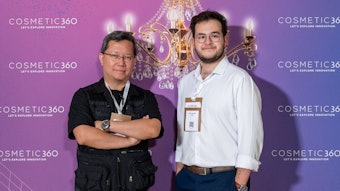
Editor's note: Our "Words from Wiechers" series considers the lessons our industry can learn from the late Johann Wiechers, Ph.D. He was an advisor, colleague and leader in the industry until his unexpected passing. Presenting Wiechers's insights is Tony O'Lenick.
This month, we review Chapter 30 of Wiechers's book, Memories of a Cosmetically Disturbed Mind, which includes a new wrinkle in the topic discussed previously in Chapter 29, Indecent Proposal. In both chapters, the notion of exclusive business arrangements between cosmetic ingredient suppliers and manufacturers, along with their greater implications, are depicted as a game.
The Exclusivity Game
Wiechers proposes, in another "game" scenario related to "exclusive" agreements between cosmetic companies (see previous Indecent Proposal discussion):
"In this variant of the game, there are four players seated around a table. Each player receives 100 Euros and has to decide independently from the others how much money (s)he will put on the table. The combined money on the table will be counted and doubled, and divided equally over the four players irrespective of their contribution. This procedure is repeated ten times.
"So, if all four players put 100 Euros on the table, they will all get 200 Euros in return. If all four put forward their full capital every time, then they will all double their assets every round. They could all have a staggering 102,400 Euros at the end of ten rounds. What a great game this is!
"However, if one or two players decide not to put money on the table, they earn money from the doubled contributions of the other three or two. For instance, your neighbor and yourself (the good guys) put in 100 Euros, but your other neighbor only submitted 50 Euros, and the person opposite you, nothing at all. That makes only a miserable 250 Euros and therefore, two times 250, i.e., 500 Euros, is equally split between the four of you. That’s only 125 Euros for a 100 Euros investment, although your partner opposite you is laughing up his sleeve since he got 125 Euros without any investment at all! What kind of partner is that?
"You can easily understand what will happen [following]. In the next round, the contributions of most players will decrease and at the end of the game, nobody is investing any longer. In real life situations, this happens, on average, in the fifth round. From the point of view of the profit-minded Homo economicus, this is not logical at all. We have access to a guaranteed way of making money but will not do this just to have more than others for a short while, whereas we know that this will damage us in the long run.
'Societies with an above-average share of punishers are better able to survive events that threaten the whole group. The altruistic act of punishing a defector will help the species to survive.'
"Recently, a way has been found to make all players behave fairly again in this public game. If the option of punishing your co-players is introduced, the level of defection goes down whereas the willingness to put money on the table increases and so do the profits. In the above example with only 250 Euros on the table, you and your good neighbor could pay 10 Euros each into a separate fund but the traitors then would have to pay tenfold (200 for 2 x 10 Euros from the good guys) that amount for paying nothing, or five-fold for paying only 50% of the maximum. This money also goes into a separate fund and not back to the table. If defectors are severely punished in this way, the contributions will remain high until the very last round of the game.
"Evolutionary economists have tried to explain such behavior by pointing out its fitness-of-the-species advantage. Societies with an above-average share of punishers are better able to survive events that threaten the whole group. The altruistic act of punishing a defector will help the species to survive. In the animal kingdom, we see such behavior predominantly between close relatives but humans seem to be controlled by economic rather than genetic ties."
Cosmetic Parallels
"Now, back to the issue of ‘exclusivity’ of cosmetic ingredients. To change from the impact of the public game situation to that of the public goods game situation, one should change the ‘exclusivity’ concept from a deal between only two parties—i.e., one supplier and one customer with one proposer and one acceptor, albeit with unclear roles—to a deal between at least four parties (one supplier and three customers).
"To prevent people from turning traitor, all parties should be able to impose sanctions on the defecting party if they do not stick to the deal. As in evolutionary economics, the group, in this case the cosmetic industry, will favor from this approach. It may sound rather radical but I am sure you can recall a situation where an 'exclusivity' deal led to reduced profits.
"Suppose the supplier did put his or her money on the table but the customer did not. How would this situation be if there were three customers? Based on evolutionary economics, we should see an increased need for sticking together, especially in these bad economic times—a metaphor for the events that threaten a biological group.
'This concept described by Wiechers, I believe, minimizes the creativity of our industry.'
"Will it work? I honestly do not know. After all, I am only a theoretical evolutionary cosmetic scientist reading a book on economic games wanting to try a behavioral-sociological experiment. One thing, however, I do know for sure: I wrote this column exclusively for you ... and this is ‘exclusivity’ in its new definition.
"My last question to you is: Will you now put your money on the table? Only then you will discover the answer to your equally fairly justified question of whether I will put my money where my mouth is. And for those of you who thought I was serious in my exclusivity suggestions, please be informed that any form of price deals is illegal. After all, it all started with an Indecent Proposal..."
The Lesson
While I understand the beneficence of the underlying thoughts and sentiment, I suggest that unless there are specific public interest factors that relate to this concept, the market—not regulations, but the market—should be the force that corrects these matters.
The public interest factors I can think of (and there are several) include: 1) if the product being discussed is a drug needed to keep a patient alive; or 2) an invention that needs to be dedicated to the public for public safety. One such invention was seat belts.
In the cosmetic industry, I cannot think of a product that would either be a matter of life or death, or an overriding public safety invention. Perhaps I am wrong.
This concept described by Wiechers, I believe, minimizes the creativity of our industry. If there is a situation where exclusivity allows a cosmetic company to corner the market, competitive research will look to develop a technology that overcomes the exclusivity. The patent concept here is to “design around.” As the idiom goes, “There is more than one way to skin a cat."
Additionally, the consumer determines the value they put on a product and they set the price they are willing to pay based upon that. In short, the market will decide and adapt.










